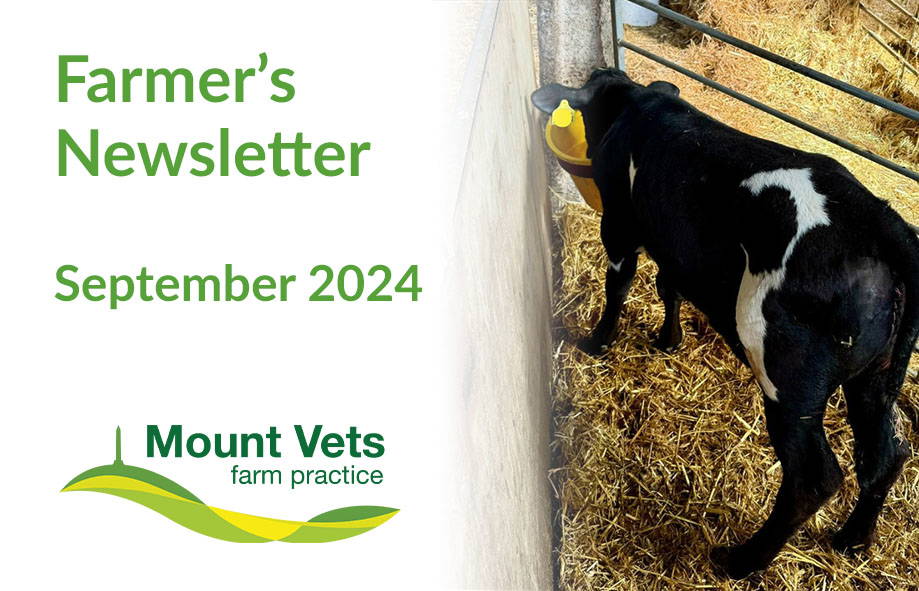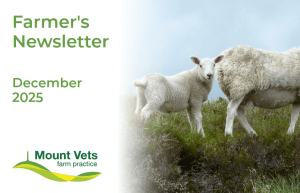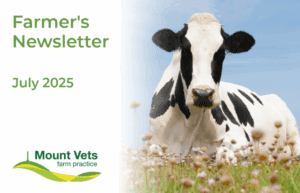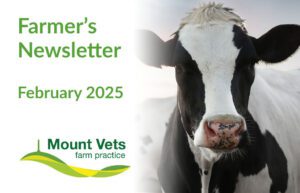September 2024
Here is the latest from our farm team at Mount Vets. If you would like any further advice or would like us to cover something in the next newsletter, please call us on 01823 662286 or contact us here.
We want to hear your feedback… Leave us a review!
We value your feedback and comments and would appreciate if you could take the time to leave us a review! Please follow the link to share your thoughts.
Perineal Urethrostomy
We had a recent interesting surgery for a calf with a ruptured penis. This meant urine was pooling under his belly beneath the skin. Rupture is commonly caused by urinary stones. Predisposing factors for these include early castration, limited water access, excessive concentrate feeding or urinary tract infections. There were no obvious risk factors for this calf, so he was just unlucky!
Clinical signs included a distended belly, dull demeanour and straining to pass urine/faeces. Without surgery, the calf would eventually die from waste product build up within the body, which should have otherwise been excreted out of the body by urine outflow.
Stones are commonly located towards the end of the penis (orange circle), so we surgically make a new exit just below the anus (blue square). It’s a fiddly surgery but very rewarding even if you do get covered in urine!
The calf was restrained using sedation and a high-volume epidural, meaning he couldn’t feel anything from the waist down for about 2 hours. The penis was incised and stitched to the skin to prevent it closing back over. This creates a permanent new opening for urine to pass through.
Complications of these include the new urine exit closing over, so this must be monitored and surgically addressed if it occurs. There was some sloughing of skin from his belly, due to urine build up, this is to be expected in these cases. After surgery the calf was much brighter and over the next couple of weeks recovered.
Bluetongue Update Autumn 2024
(written by Charlie Aldington)
As many of you are no doubt aware, thanks to the constant stream of APHA emails, Bluetongue (BTV-3) has returned alongside the start of peak midge season. This was a fairly predictable outcome given the narrow escape we had last year, and it popped up earlier in the year than last time. This may potentially give the virus more time to circulate further across the country before it starts to get cold enough that the midges become less effective carriers, though hopefully the surveillance testing and movement restrictions in the high-risk areas may slow this down.
As with last year, most cases of BTV-3 this autumn have been found in the South East in Essex, Kent, East Sussex, Suffolk and Norfolk. However, surprisingly, there was a further case detected through surveillance in Yorkshire, so it is important for all of us to remain vigilant for symptoms, even whilst there are no current cases on our doorstep (as of 16/9/24).
This disease affects all ruminants, such as cattle, sheep, goats, camelids, and deer. After infection with the virus via infected midge bites, the severity can vary from unnoticeable to death – this varies between species (disease tends to be more severe in sheep than cattle and goats) but also between individuals.
All ruminant keepers must remain vigilant for any of the following symptoms this coming autumn and winter and call us or the APHA to discuss if you are suspicious.
- Fever
- Depression, trouble breathing or panting with excessive salivation
- Nasal discharge which will start clear and progress to a snottier discharge, may crust around the nostrils
- Reddening around the eyes, nostrils and mouth.
- Swelling of the muzzle, lips, eyelids, ears or tongue. This may then progress to a tongue that is bluish in colour which may protrude out of the mouth – this is not present in every case and more likely to be seen in sheep.
- Ulceration around the lips, tongue and inside the mouth.
- Lameness, usually of multiple feet. Usually accompanied with reddening and swelling of the coronary band (where the skin/hair meets the hoof), can look similar to CODD in sheep but affecting multiple feet. This can be extremely painful affecting multiple feet, which may result in sheep or cattle standing in a similar stance to a laminitic pony – with back arched and feet tucked in under them.
- You may also be able to spot a reddening of the skin in the armpits and groin of affected sheep.
- Abortions, stillbirths, weak lambs/calves, poor reproductive performance, congenital defects causing neurological symptoms.
- General emaciation, production losses, poor thrift and wool loss may be seen in sheep.
- In cattle, the symptoms are largely the same as those listed above for sheep, though typically not as severe. Symptoms that tend to be more cattle-specific would include teat and vulva lesions, poor fertility and reduced milk yield.
In terms of prevention, we are not quite as defenseless as we were this time last year, however the vaccines may only be feasible for highly valuable pedigree stock. We have recently been informed that it is possible to apply for a license to use one of three BTV-3 vaccines. Bear in mind that these vaccines, for now, are mostly available for use within the High-Risk counties to manage supply towards where it is needed most, though it may be possible to apply for use under a specific license through the APHA shortly in discussion with your vet. These vaccines do not prevent infection or transmission of the virus, though they should reduce severity of symptoms and reduce the risk of dying – think of it like the COVID vaccine.
Think very carefully about sourcing animals from the South East of England. Any ruminants being moved out of the Restricted Zone must be done under licence, following a negative blood test. However, within 6-10 days of the movement, you are required to do post-movement testing on that animal and will be under movement restrictions until you do. It is the responsibility of the keeper to organize this with UKFarmcare. You also cannot currently import ruminants from countries affected with the disease such as France, The Netherlands, Germany, Denmark and now Norway – all of whom have seen cases this summer as well. Ask for pre-movement testing on any animals being imported from other parts of Europe.
Unfortunately, there is no evidence behind any insect repellents preventing the spread of Bluetongue, though they should be being used anyway this time of year for general fly control.
Aside from that, it comes down to management practices in order to try and reduce midge exposure. Midges are particularly fond of fields with good tree cover, boggy areas and streams and that are sheltered from the wind. Midges struggle to fly with a crosswind so if available, try to graze more exposed hillsides away from natural water sources if BTV-3 does creep closer. Alternatively, housing sheep or cattle and installing very fine midge netting over all inlets to the shed can also help – especially if you can set up large stock fans to keep a good crosswind going across the shed. Obviously, these are measures that are likely to only be practical for small groups of very valuable animals. As midges are most active at dusk and dawn, consider housing overnight, and letting out during the day as a compromise, though still riskier than full-time housing.
As Bluetongue is a notifiable disease, if you are at all suspicious of any of the above symptoms, you must call us or the APHA (on 03000 200301) to discuss. You can, of course, call for any other questions or advice on 01823 662286. Further BTV-3 vaccine product information is also available on request.
Calf Resuscitation
(written by Charlie Aldington)
The day a calf is born is arguably the most important of its life and is also the time that it is most vulnerable. Luckily the majority of calvings progress without a hitch with the calf up and suckling asap. On the odd occasion, calves may need extra help, especially if there have been any difficulties during the birthing process. As you can imagine, these are the calvings that we as vets see the most, so here’s a handy guide to resuscitating a newborn calf.
Position
The position that we get the calf into is key. The first step is to move the calf away from the back end of the damn (keeping the ropes on for this is helpful) and into the calf recovery position. This position entails sitting the calf up on their chest. Both front legs should be extended out in front of the calf and there should be one back leg either side of the calf extending towards its head. This position allows both lungs to inflate fully compared to if they are flat out on one side.
We should absolutely be avoiding hanging calves upside down by their back legs. This does not achieve anything beneficial and could cause harm to the calf. Any fluid that drains out of a calf when it is hanging upside down more than likely is coming from its stomach rather than the lungs. Also, when upside down, the intestines will be pressing down on the diaphragm stopping the lungs from inflating fully.
Stimulation
- Vigorously rubbing the calf with dry straw or a towel can help to stimulate the calf and get it to start breathing.
- Firmly pinching the nasal septum (the tissue between the nostrils) and gently poking a piece of straw into a nostril are great ways of stimulating the calf to breathe.
- A few drops of water into the ear of a calf can sometimes trick the body into thinking it is drowning causing the calf to gasp and start breathing. Chucking a bucket of cold water on the calf’s head can also achieve the same thing.
Pain Relief
Calves that have had a difficult birth could also benefit from receiving a pain relief injection such as Metacam alongside pain relief for the dam.
Image taken from: (https://shoofint.com/antahi/assisting-a-calf-after-a-difficult-birth/)
Upcoming courses
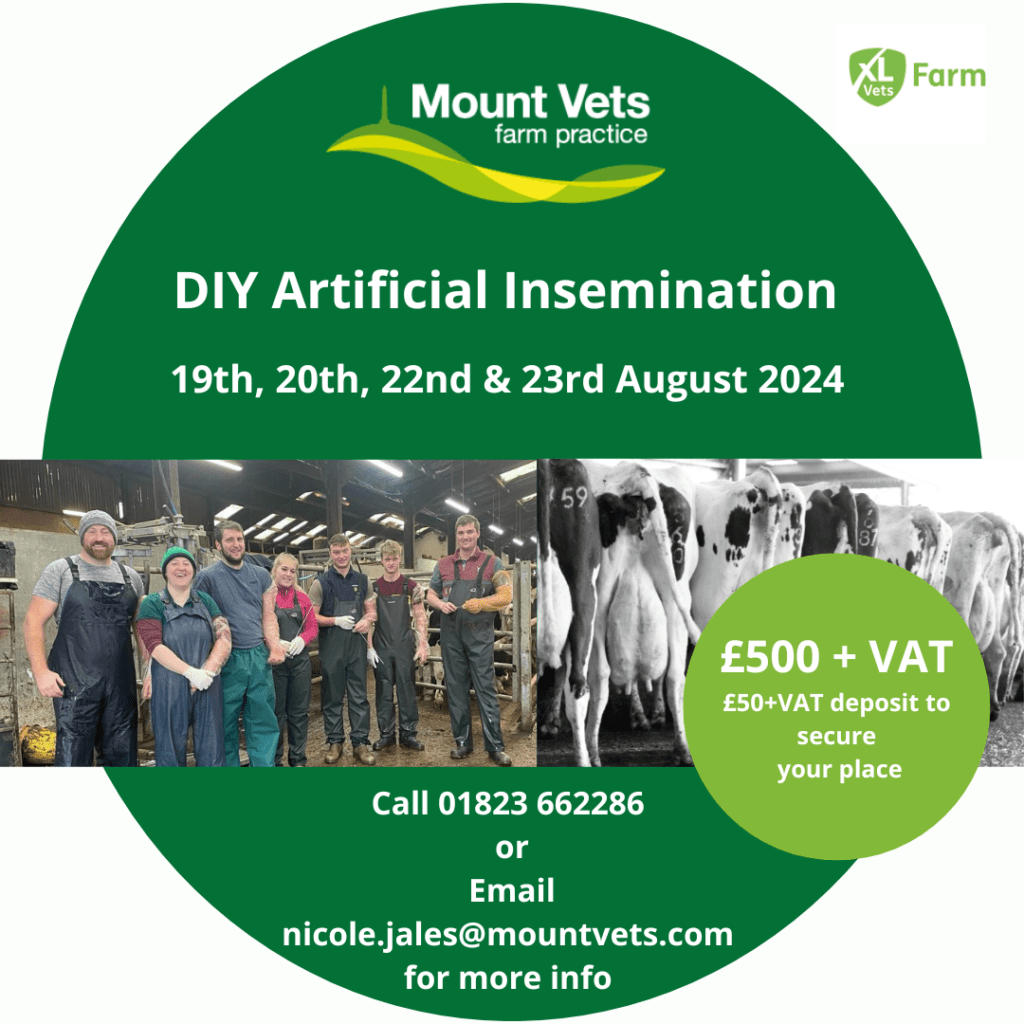
DIY Articial Insemiation Course
Our next 4-day DIY AI course will run on 19th, 20th, 22nd & 23rd August 2024.
This DEFRA approved course is aimed at anyone who has no previous experience in the artificial insemination of cows.
The 4-day course is run by our experienced farm vet Rob Mangham and is full of theory and practical sessions to make sure you leave feeling confident and safe in all aspects of AI.
The cost of the course is £500 + VAT, with a £50+VAT deposit to secure your space.
(Deposit will be taken off final amount)
Please ring the practice to book your place on any of our courses on 01823 662286 or email farm@mountvets.com
Meet the Team!
We have an experienced & friendly team here at Mount Vets. You might already recognise a few faces but over the next few months we will reintroduce you to some of our excellent team. To read more and see more of the faces of Mount Vets visit our team page, and be sure to follow us on Instagram and Facebook.
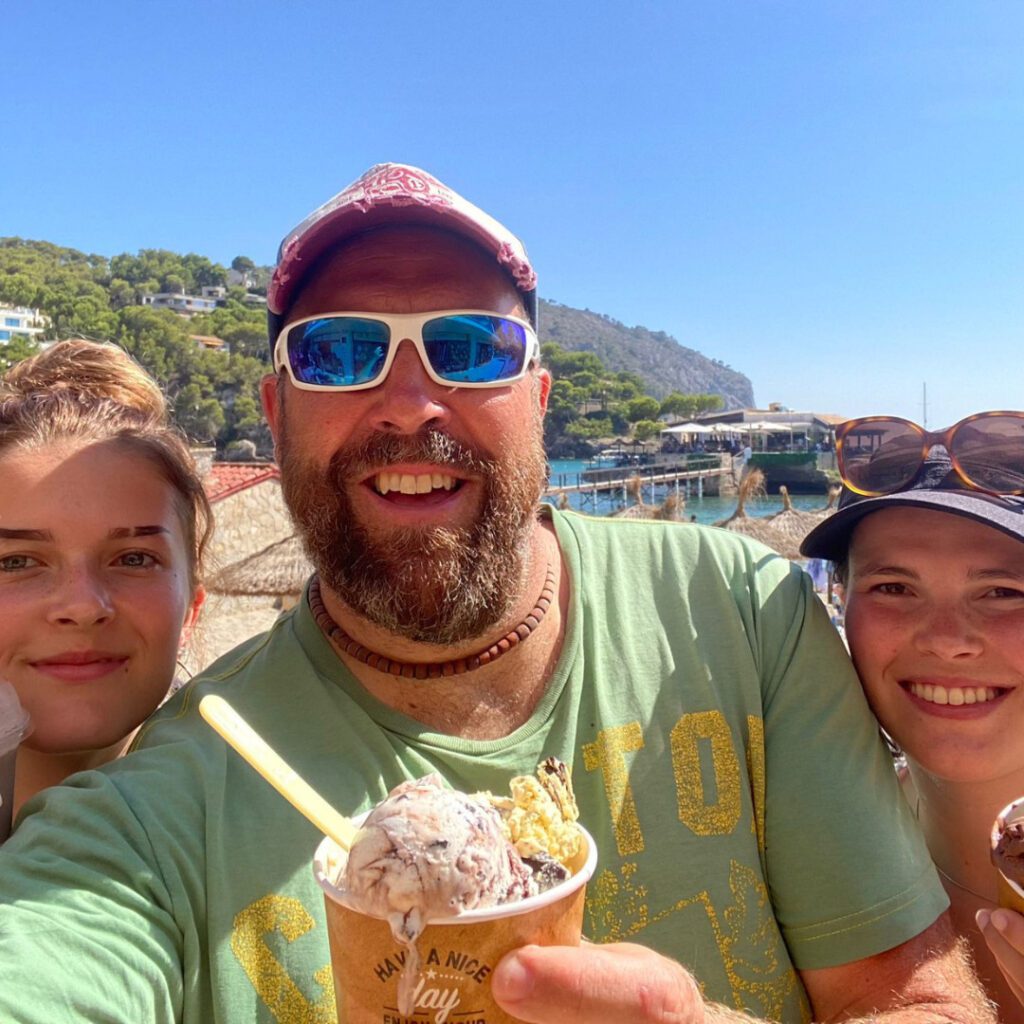
Piers Pepperell
Director
Many of you will already know our Mount Vets Director Piers; but did you know he has appeared on tv show Blind Date with Cilla Black?
Piers loves to spend a free day with his two daughters and three dogs, surfing on the North Devon Coast.
His favourite vet call out was when he was called into the waiting room and unknown to him at the time, but he then met his wife to be. She had brought in her eight baby bunny rabbits, which led on naturally to a 10-minute chat about pig wormers and her asking Piers out on a date.
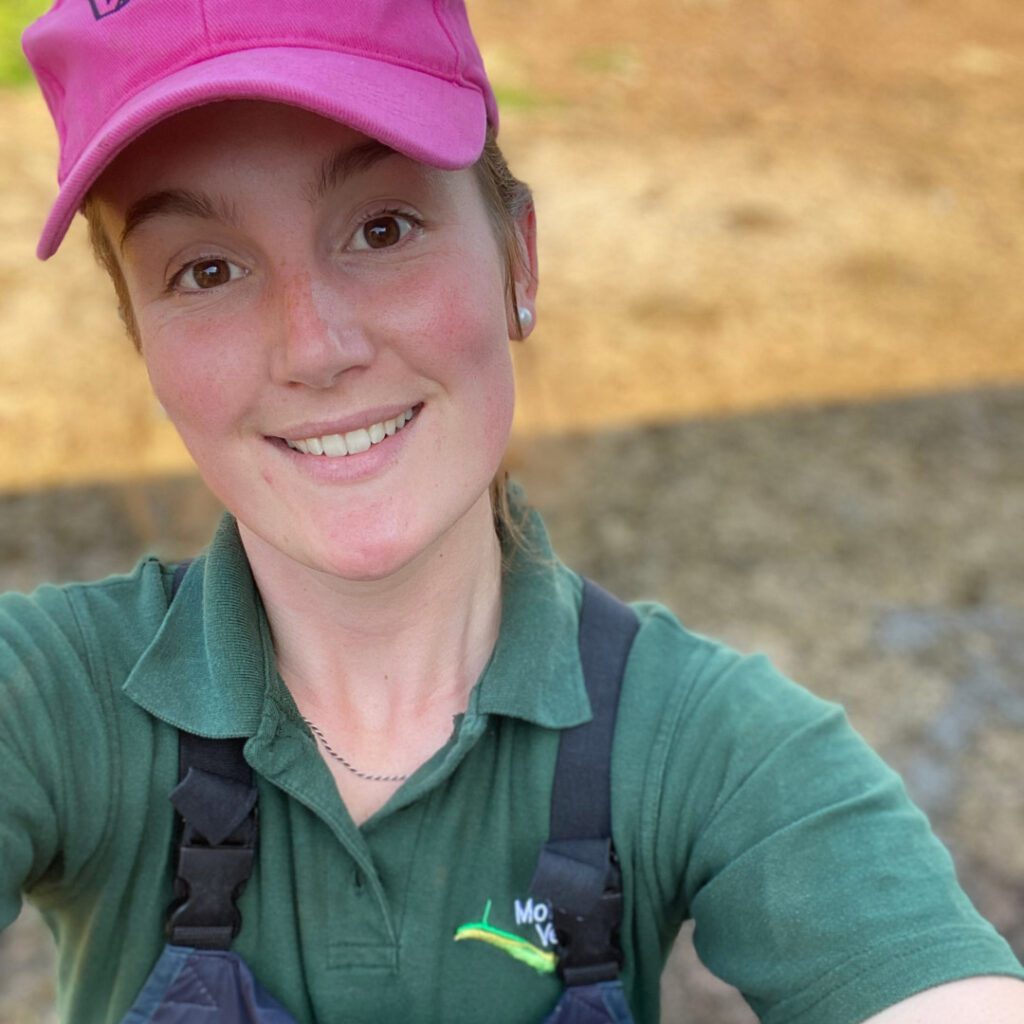
Pip White
Vet
Pip is one of our large animal vets. If you’ve met her, you will probably know how much she loves her cows. So much so, that she loves to spend her free time at home with her cows! That, or in the showring showing them. 🐮
Pip graduated as top student in her year from the University of Surrey.
Her favourite song is Mr Brightside by the Killers.
Have a question about any of the topics covered in this newsletter?
If you need any assistance with the topics covered in this newsletter, please do not hesitate to get in touch with our experienced farm vets who will be able to help. Call 01823 662286, or contact us here.
